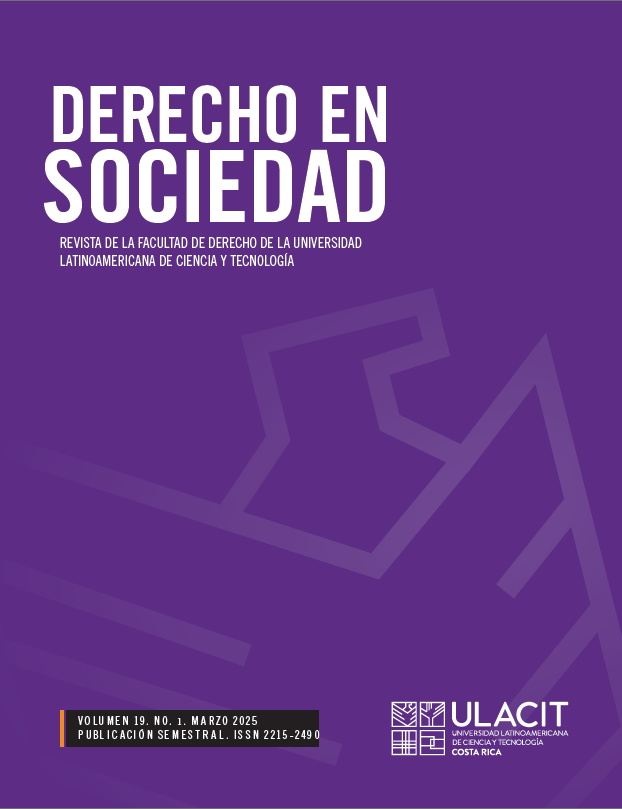Nationalist movements as keys to the solution of the Palestinian-Israeli conflict

Published 2025-03-31
Keywords
- Palestinian – Israeli conflict ,
- nationalist movements ,
- identity, self-determination ,
- peace
How to Cite
Copyright (c) 2025 Derecho en Sociedad

This work is licensed under a Creative Commons Attribution-NonCommercial-ShareAlike 4.0 International License.
Downloads
Altmetrics
Abstract
The conflict between Palestinians and Israelis is one of the longest and most complex confrontations
inherited from the past century, marked by a series of factors such as armed clashes, population
displacements, and diplomatic movements to assert their positions. Due to this, nationalism plays
a fundamental role in accentuating the confrontations and is the central basis for promoting a
just and lasting solution to the conflict. With the emergence of the Jewish national movement
(Zionism) in the late 19th century and the rise of Palestinian Arab nationalism during the 20th
century, both movements have transformed into platforms of identity and the assertion of the
rights of both populations. The Zionist movement promoted the creation of a national home for
the Jewish people in the ancestral land of Israel, achieving its goal with the founding of the State of
Israel in 1948. On the other hand, Palestinian nationalism has sought self-determination and the
recognition of an independent state in the historical territories of Palestine, leading to the creation
of representative bodies, although initially focused on achieving this objective through a war of
destruction against the Israelis. Understanding how nationalist movements could contribute to
solving the conflict involves analyzing the historical and cultural roots of these identities, as well
as contemporary political and social dynamics. The aspirations of both peoples could be key to
achieving sustainable and just peace.
References
- Ariel, Y. (2006). On behalf of Israel: American fundamentalist attitudes toward Jews, Judaism, and Zionism. Hebrew Union College Press.
- Bar-Tal, D. (2013). Intractable conflicts: Socio-psychological foundations and dynamics. Cambridge University Press.
- Bard, M. G. (2006). Arab-Israeli conflict.
- Barnavi, É. (2008). Cinco proposiciones sobre la historia del sionismo político. Araucaria, 10(19).
- Beinin, J., & Hajjar, L. (2014). Palestine, Israel and the Arab Israeli conflict. Middle East Research and Information Project.
- Bregman, A. (2016). Israel's wars: A history since 1947. Routledge.
- Brubaker, R. (1996). Nationalism reframed: Nationhood and the national question in the new Europe (Vol. 8). Cambridge University Press.
- Cyjon, R. (2021). Perspectivas y reflexiones sobre el conflicto árabe-palestino, judío-israelí. Cuadernos Judaicos, (38), 3–37.
- Cox, R. W. (1993). Fuerzas sociales, estados y órdenes mundiales. En A. Morales.
- Gelvin, J. L. (2021). The Israel-Palestine conflict: A history. Cambridge University Press.
- Goellner, A. Poder y política internacional (II).
- Kaplan, E., & Penslar, D. J. (Eds.). (2011). The origins of Israel, 1882–1948: A documentary history. University of Wisconsin Press.
- Kattan, V. (2009). From coexistence to conquest: International law and the origins of the Arab-Israeli conflict, 1891–1949. Pluto Press.
- Kaufman, E., Salem, W., & Verhoeven, J. (Eds.). (2006). Bridging the divide: Peacebuilding in the Israeli-Palestinian conflict. Lynne Rienner Publishers.
- Keidar, M. (2021). A practical plan for peace? [Podcast]. Spotify. https://open.spotify.com/episode/30mKvbtX5eQ2dbb94UEIGg?go=1
- Khalidi, R. (1997). Palestinian identity: The construction of modern national consciousness. Columbia University Press.
- Khalidi, R. (2007). The iron cage: The story of the Palestinian struggle for statehood. Beacon Press.
- Kimmerling, B. (2001). The invention and decline of Israeliness: State, society, and the military. University of California Press.
- Kirjner, J. (2018). Conflicto y construcción de identidades nacionales en Israel y Palestina (1948–1967) [Tesis de licenciatura]. Universidad Nacional de La Plata.
- Mearsheimer, J. (2003). The tragedy of great power politics. Norton.
- Mena, Y. (2022). Análisis del conflicto palestino-israelí en el período 2014–2021 desde el enfoque de la construcción de la identidad nacional de ambas poblaciones [Tesina de bachillerato]. Universidad Internacional de las Américas. http://repositorio.uia.ac.cr:8080/server/api/core/bitstreams/b696db7d-70e8-4366-999b-d9dd375882e7/content
- Morris, B. (2001). Righteous victims: A history of the Zionist-Arab conflict, 1881–2001. Vintage.
- Milton-Edwards, B., & Farrell, S. (2010). Hamas: The Islamic resistance movement. Polity.
- Naciones Unidas. (1960). Le droit du peuple palestinien à l’autodétermination. https://acortar.link/1jNKR8
- Peleg, I., & Waxman, D. (2011). Israel’s Palestinians: The conflict within. Cambridge University Press.
- Petri, D. P., & Acuña, B. (2022). El Estado desmilitarizado costarricense: ¿un modelo de resolución de conflictos? En D. P. Petri (Ed.), Negociación internacional en América Latina (pp. 183–216). FLACSO.
- Priego, A. (2020). El Acuerdo de Abraham sí es el ‘acuerdo del siglo’. Política Exterior.https://www.politicaexterior.com/el-acuerdo-de-abraham-si-es-el-acuerdo-del-siglo/
- Pullan, W., Sternberg, M., Kyriacou, L., Larkin, C., & Dumper, M. (2013). The struggle for Jerusalem's holy places.Routledge.
- Rehan, S. (2023). Israel-Palestine conflict and Arab League policy towards conflict resolution: A case study of neorealism, constructivism, and Arab League analysis.
- Sachar, H. M. (2007). A history of Israel: From the rise of Zionism to our time. Knopf.
- Said, E. W. (2013). La cuestión palestina. Debate.
- Shlaim, A. (2015). The iron wall: Israel and the Arab world. Penguin UK.
- Schulze, K. E. (2013). The Arab-Israeli conflict. Routledge.
- Soto Reyes Garmendia, E. (2006). Federalismo, sociedad y globalidad: los retos del porvenir. Política y cultura, (25), 27–45.
- Tal, A. (2008). Enduring technological optimism: Zionism's environmental ethic and its influence on Israel's environmental history. Environmental History, 13(2), 275–305.
- Taleb, N. N. (2018). Skin in the game: Hidden asymmetries in daily life. Random House.
- Waxman, D. (2019). The Israeli-Palestinian conflict: What everyone needs to know. Oxford University Press.

